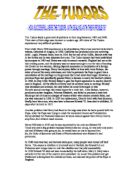The Tudors in the period 1485 - 1525 were more seriously threatened by revolts over taxation than by dynastic challenges to them. How far do you agree with this statement?
The Tudors in the period 1485 – 1525 were more seriously threatened by revolts over taxation than by dynastic challenges to them. How far do you agree with this statement?
Throughout the early Tudor period there was a succession of regional rebellions against the government’s changes in the tax system. Twice, in 1489 and 1497, these revolts were ruthlessly crushed, and then twice again in 1513, but this time the resistance was passive and the rebellion succeeded. Of the revolts faced by Henry VII there were two caused by dynastic intention: the imposture of Lambert Simnel as Edward, earl of Warwick, and Perkin Warbeck as Edward IV’s younger son, Richard of York. In addition to those and although the intention of the plot was never stated, Lord Lovell and the Stafford brothers were clearly intent on over turning Henry VII’s usurpation, in possible favour of the earl of Warwick. All revolts are a possible threat to the king, but the circumstances, the support gained and the consequences determine whether the treat is serious. A rebellion does not have to be successful to be considered a threat. Undermining the king’s authority, threatening his personal safety, rousing trouble within the nobility and limiting his actions in other areas of his kingship; such consequences of a revolt would suggest it as a serious threat to the monarchy.
In agreement with the statement, the frequency of the tax rebellions throughout the reigns of Henry VII and Henry VIII does suggest that these more seriously threatened the monarchy as they happened more often than the dynastic revolts. Compared with the Lambert Simnel and Perkin Warbeck impostures of 1487 and 1497, the taxation rebellions occurred in 1489, 1497, 1513 and 1525. Revolts against taxation are always a threat to the king as they ultimately involve money that the government wanted or needed but was unable to get. Tudor governments lacked an army with which to maintain obedience, they therefore needed to persuade or convince their subjects to remain passive through a generally accepted theory of obligation and submission. Making concessions regularly undermines the king’s authority and may have long-term detrimental effects on other areas of government. The resistance to the Amicable Grant in 1525 had a significant impact on foreign policy as Henry VIII was forced to abandon his schemes in Europe and peace was France was the only course of action. It also affected his ability to tax again later on, because if he had not been dispensing royal land he may not have been able to tax and then to continue with his large scale continental plans. Compromising shows that there are limitations to the Tudor state and that there are restrictions on having an extensive foreign policy, which is overall a threat to the control and authority that the monarch had.







